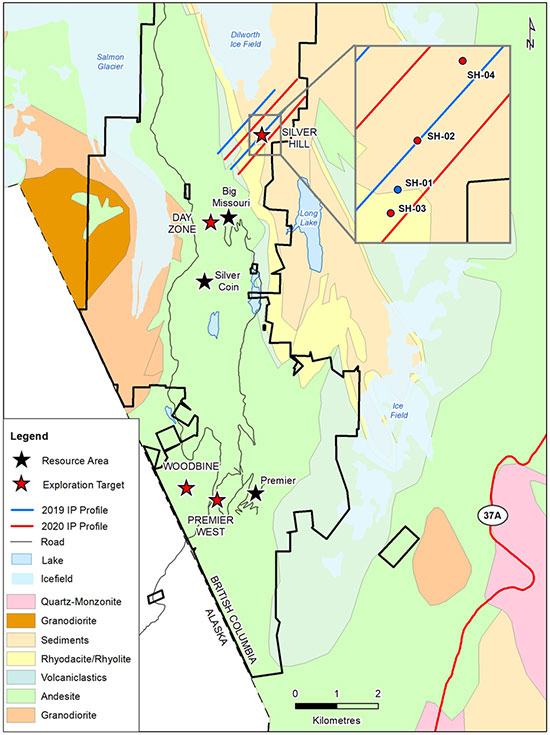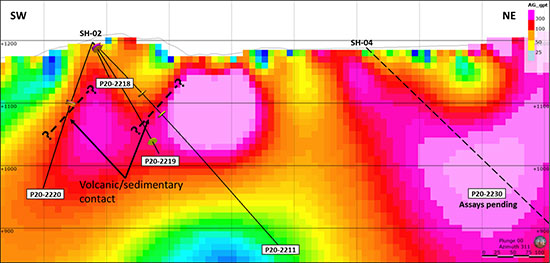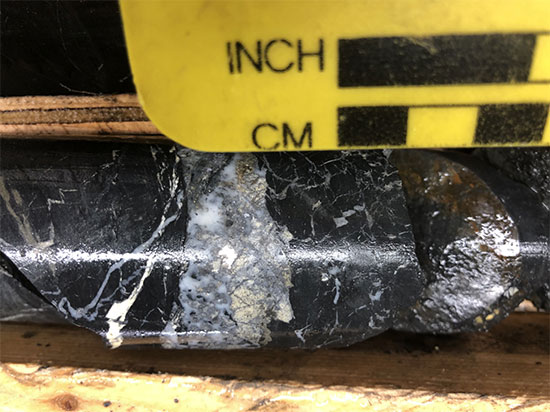Vancouver, B.C. October 8, 2020 — Ascot Resources Ltd. (TSX: AOT; OTCQX: AOTVF) ("Ascot" or the "Company") is pleased to announce high-grade silver intercepts at the Silver Hill prospect (see Figure 1) at the Company's Premier Gold Project ("PGP"). These holes are from drill pad SH-02 at Silver Hill located 260 metres to the northeast of last year's intercepts from SH-01, demonstrating the presence of wide-spread mineralization in the area.
Highlights from Silver Hill include:
- 1,320g/t Ag over 1.00m in hole P20-2211
- 154.3g/t Ag over 7.12m in hole P20-2220
- 4.31g/t Au over 1.00m in hole P20-2219
The Company completed six drill holes from three pads at Silver Hill in August 2020. This news release summarizes the results from four drill holes (for a total of 1,005m). Assays for the other two holes at Silver Hill and for additional holes from the Day Zone are pending and will be released as soon as they are available. We are experiencing delays at our assay lab caused by end of season crunch and reduced capacity for sample preparation due to Covid-19 procedures.
Derek White, President and CEO of Ascot commented, "The results from Silver Hill are very exciting. This prospect represents an area with different geology and a different target type than at the rest of the PGP. The northeastern part of our claims contains a volcanic/sedimentary contact similar to that which hosts the Eskay Creek deposit. In 2019 we intersected high-grade silver at the edge of much younger dykes and suspected that this mineralization was remobilised from a deeper source. The new results show mineralization to occur over a significant strike length and not exclusively related to dyke contacts. We believe that there is a hydrothermal system at the contact of volcanic and sedimentary units with the potential to have formed a deposit at this stratigraphic level. This interpretation is preliminary, but we are anticipating additional supportive results and are extremely keen to conduct further follow-up work in this area next year."
Silver Hill
In 2019, the Company issued two news releases on the Silver Hill prospect (November 7 and December 16), reporting high-grade silver mineralization in grab samples and later in four drill holes. The mineralization occurred at the edge of Tertiary dykes intruding a volcano-sedimentary sequence of rocks. Two geophysical profiles were also completed to collect chargeability and resistivity data over the prospective area. These profiles detected strong chargeability anomalies that appear to extend for several hundred metres between the profiles. At the time, it was proposed that the mineralization constitutes remobilization from deeper levels along the edges of the much younger dykes, possibly from older mineralization along the contact between volcanic and sedimentary rocks.
In 2020, the Company conducted a follow-up program consisting of six drill holes from three new pad locations and collecting geophysical data along two additional profiles. This news release describes the results from the first four drill holes from SH-02 (see Table 2) which is located 260 metres to the northeast of last year's drill pad SH-01. The drill holes were designed to trace surface showings at depth, test geophysical anomalies from last year (see Figure 2) and establish the stratigraphic sequence in this area that has not been mapped in detail.
The recent drill holes have assisted in clarifying the stratigraphy in this part of the property as they intercepted carbonaceous mudstone of the Bowser formation at the top, followed by volcanic rhyodacite of the Dilworth formation and andesitic flows and tuffs of the Betty Creek Formation. Elsewhere on the property, the Betty Creek Formation is overlying the andesite flows of the Unuk formation that hosts the gold mineralization at Premier, Big Missouri and Silver Coin. The stratigraphic position of the Silver Hill prospect is therefore much higher than that of the prolific gold mineralization elsewhere on the property.
Table 1 Summary of exploration drill results from Silver Hill
|
Hole # |
pad |
azimuth/dip |
From |
To |
Width |
Au |
Ag |
Zn |
|
P20-2211 |
SH-02 |
45/-45 |
9.30 |
10.30 |
1.00 |
0.09 |
283.0 |
1.43 |
|
|
|
|
14.40 |
15.40 |
1.00 |
0.25 |
1320.0 |
0.41 |
|
|
|
|
113.50 |
115.50 |
2.00 |
0.07 |
74.1 |
0.13 |
|
|
|
|
159.80 |
160.50 |
0.70 |
0.07 |
95.9 |
0.07 |
|
P20-2218 |
SH-02 |
45/-65 |
12.44 |
13.44 |
1.00 |
0.01 |
5.6 |
1.19 |
|
P20-2219 |
SH-02 |
90/-45 |
10.98 |
13.98 |
3.00 |
0.19 |
279.8 |
0.32 |
|
incl. |
|
|
11.98 |
12.98 |
1.00 |
0.05 |
446.0 |
0.65 |
|
|
|
|
16.34 |
16.94 |
0.60 |
0.02 |
55.3 |
0.77 |
|
|
|
|
111.80 |
112.80 |
1.00 |
4.31 |
16.4 |
0.15 |
|
|
|
|
223.82 |
224.82 |
1.00 |
0.44 |
42.7 |
0.06 |
|
P20-2220 |
SH-02 |
225/-70 |
100.54 |
107.66 |
7.12 |
0.28 |
154.3 |
0.29 |
|
incl. |
|
|
101.54 |
102.54 |
1.00 |
1.58 |
739.0 |
0.85 |
True width is uncertain as there is not enough information about the orientation of mineralization in this area.
Drill holes 2211 and 2219 intercepted high-grade silver mineralization (see Table 1) close to surface at the contact of dykes intruding the mudstone, very similar to the mineralization reported last year. The intercept of 1,320g/t Ag over a metre in drill hole 2211 is particularly spectacular. Figure 3 depicts the mineralization from that interval.
The intercept in hole 2220 is very encouraging as it shows strong mineralization over a more significant width. This intersection and the deeper intercepts in holes 2211 and 2219 are significant as mineralization occurs very close to the contact between the sedimentary and volcanic packages rather than at the edge of dykes. This stratigraphic position is prospective for Eskay Creek style massive sulfide deposits.
The geophysical anomalies map out the extent of the prospective system as they detect the pyrite that is associated with the mineralization. The contact between sedimentary and volcanic rocks traces across the Company's property for more than 10 kilometres and is prospective along its entire distance. The Company will develop a strategy to explore this contact systematically next year.
Drilling has been shifted back to lower elevations at the Woodbine prospect where two drill rigs are operating at this time.
Table 2 Drill pad location
|
Pad # |
UTM N |
UTM E |
Elevation (masl) |
Hole no. |
|
SH-02 |
6221477 |
437236 |
1198 |
2211, 2218-2220 |
Figure 1 Image of the Company's Premier property showing the location of the four areas of 2020 exploration activity, the three resource areas as well as major geological units as described in the body of the release. The inset shows the location of drill pads at Silver Hill.
Figure 2 Northwest looking cross section through the drill holes discussed in this release. The holes are superimposed on a chargeability profile. Drill hole 2230 has been completed and assays are pending. Pads SH-01 and SH-03 are to the southwest of SH-02 beyond the extent of this section.
Figure 3 Image of electrum (alloy of gold and silver) in a quartz vein hosted by argillite from drill hole P20-2211.
Qualified Person
Lawrence Tsang, P. Geo., the Company's Senior Geologist provides the field management for the Premier exploration program. John Kiernan, P. Eng., Chief Operating Officer of the Company is the Company's Qualified Person (QP) as defined by National Instrument 43-101 and has reviewed and approved the technical contents of this news release.
Quality Assurance/Quality Control
Analytical work is being carried out by ALS Canada Ltd. ("ALS"). Ascot's quality-assurance and quality-control program includes the use of analytical blanks to monitor for cross contamination, certified reference material standards to assess analytical accuracy, and duplicate samples to quantify sampling precision. This is in addition to the internal quality assurance program employed by ALS.
Samples are dried and weighed by ALS. They are then crushed to 75% passing 2mm, with 250g split and pulverized to 85% passing 75µm. Samples are processed at the ALS preparation lab in Terrace and sent to ALS in North Vancouver for analysis. There, all samples are digested using aqua-regia with an ICP-AES finish and fire assay with AA finish for gold. Samples over 100ppm silver are digested with aqua regia and then volumetrically diluted before an ICP-AES or AA finish (up to 1,500ppm). Samples over 1,500ppm silver are fire assayed with a gravimetric finish. Samples over 10ppm gold are fire assayed with a gravimetric finish. Identified or suspected metallic gold or silver are subjected to "metallics" assays. Sampling and storage are at the Company's secure facility in Stewart.
For more information about the Company, please refer to the Company's profile on SEDAR at www.sedar.com or visit the Company's web site at www.ascotgold.com, or for a virtual tour visit www.vrify.com under Ascot Resources.
ON BEHALF OF THE BOARD OF DIRECTORS OF
ASCOT RESOURCES LTD.
"Derek C. White", President and CEO
For further information contact:
Kristina Howe
VP, Investor Relations
778-725-1060 / khowe@ascotgold.com
About Ascot Resources Ltd.
Ascot is a Canadian-based exploration and development company focused on re-starting the past producing historic Premier gold mine, located in British Columbia's Golden Triangle. The Company continues to define high-grade resources for underground mining with the near-term goal of converting the underground resources into reserves, while continuing to explore nearby targets on its Premier/Dilworth and Silver Coin properties (collectively referred to as the Premier Gold Project). Ascot's acquisition of IDM Mining added the high-grade gold and silver Red Mountain Project to its portfolio and positions the Company as a leading consolidator of high-quality assets in the Golden Triangle.
For more information about the Company, please refer to the Company's profile on SEDAR at www.sedar.com or visit the Company's web site at www.ascotgold.com, or for a virtual tour visit www.vrify.com under Ascot Resources.
The TSX has not reviewed and does not accept responsibility for the adequacy or accuracy of this release.
Cautionary Statement Regarding Forward-Looking Information
All statements, trend analysis and other information contained in this press release about anticipated future events or results constitute forward-looking statements. Forward-looking statements are often, but not always, identified by the use of words such as "seek", "anticipate", "believe", "plan", "estimate", "expect" and "intend" and statements that an event or result "may", "will", "should", "could" or "might" occur or be achieved and other similar expressions. All statements, other than statements of historical fact, included herein are forward-looking statements, including statements in respect of the closing of the Private Placement and the use of proceeds. Although Ascot believes that the expectations reflected in such forward-looking statements and/or information are reasonable, undue reliance should not be placed on forward-looking statements since the Ascot can give no assurance that such expectations will prove to be correct. These statements involve known and unknown risks, uncertainties and other factors that may cause actual results or events to differ materially from those anticipated in such forward-looking statements, including the risks, uncertainties and other factors identified in the Ascot's periodic filings with Canadian securities regulators, and assumptions made with regard to: the estimated costs associated with construction of the Project; the timing of the anticipated start of production at the Projects; the ability to maintain throughput and production levels at the Premier Mill; the tax rate applicable to the Company; future commodity prices; the grade of Resources and Reserves; the ability of the Company to convert inferred resources to other categories; the ability of the Company to reduce mining dilution; the ability to reduce capital costs. Forward-looking statements are subject to business and economic risks and uncertainties and other factors that could cause actual results of operations to differ materially from those contained in the forward-looking statements. Important factors that could cause actual results to differ materially from Ascot's expectations include risks associated with the business of Ascot; risks related to exploration and potential development of Ascot's projects; business and economic conditions in the mining industry generally; fluctuations in commodity prices and currency exchange rates; uncertainties relating to interpretation of drill results and the geology, continuity and grade of mineral deposits; the need for cooperation of government agencies and indigenous groups in the exploration and development of properties and the issuance of required permits; the need to obtain additional financing to develop properties and uncertainty as to the availability and terms of future financing; the possibility of delay in exploration or development programs and uncertainty of meeting anticipated program milestones; uncertainty as to timely availability of permits and other governmental approvals; risks associated with COVID-19 including adverse impacts on the world economy, construction timing and the availability of personnel; and other risk factors as detailed from time to time and additional risks identified in Ascot's filings with Canadian securities regulators on SEDAR in Canada (available at www.sedar.com).The timing of future economic studies; labour disputes and other risks of the mining industry; delays in obtaining governmental approvals, financing or in the completion of Project as well as those factors discussed in the Annual Information Form of the Company dated March 13, 2020 in the section entitled "Risk Factors", under Ascot's SEDAR profile at www.sedar.com. Forward-looking statements are based on estimates and opinions of management at the date the statements are made. Ascot does not undertake any obligation to update forward-looking statements.




